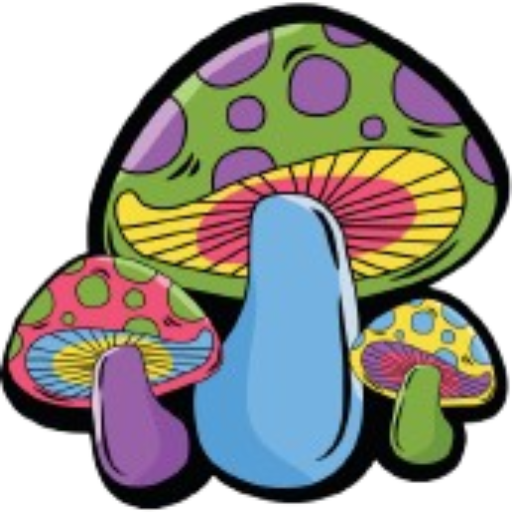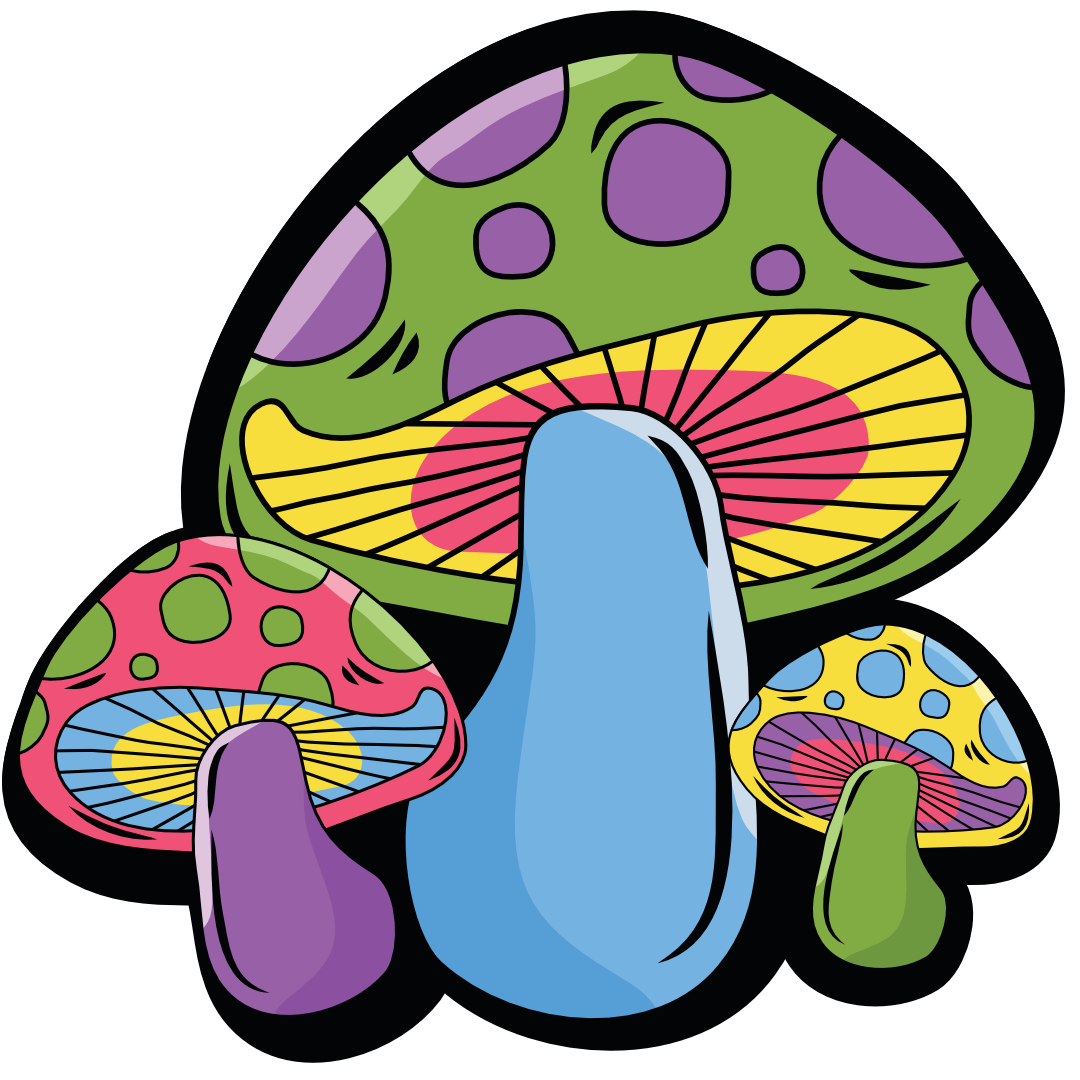Recent studies show that1 psilocybin, found in “magic mushrooms,” could be a new way to treat depression. At Johns Hopkins University School of Medicine, researchers found that therapy with psilocybin greatly improved depression in patients. Some patients felt better for over a year1. The FDA has given psilocybin therapy a “Breakthrough” status, showing it’s a promising new treatment.
Depression is becoming more common worldwide, making new treatments urgent1. The Johns Hopkins study looked at 27 people with long-term depression. After treatment, they saw big improvements in depression and these effects lasted for a year1. This is different from traditional antidepressants, which may not work well for everyone and need to be taken for a long time.
Researchers are studying how psilocybin works to help depression2. A study in February 2023 found that psilocybin can help brain cells connect better2. This shows how psilocybin could be a new way to treat depression.
Psilocybin might be a game-changer for depression, but it’s still early3. The research is promising, but there are legal and regulatory hurdles to overcome3. Still, the study of psilocybin therapy is exciting and could lead to new treatments for depression.
Understanding Depression: A Global Burden
Depression affects over 300 million people worldwide, making it the top cause of disability globally4. In the U.S., about 10% of adults got diagnosed with Major Depressive Disorder (MDD) last year4. Depression costs the U.S. economy a huge $210 billion annually4.
Prevalence and Impact of Depression
Depression hits not just individuals but also the world hard. It makes people 1.7 times more likely to die from any cause than those without it4. Over the last decade, depression cases have jumped by nearly 20%, affecting 300 million people now5. Sadly, 40-60% of those who get better might fall back into depression5.
Existing Treatment Limitations
Many treatments for depression exist, but not everyone gets them. Up to half of those treated don’t get better with current medicines4. About 30% of people have depression that doesn’t respond well to treatment, showing only slight improvement over a placebo4. This calls for new, more effective ways to fight depression’s global burden.
| Statistic | Value |
|---|---|
| Individuals affected by depression worldwide | Over 300 million4 |
| Relative risk of all-cause mortality among depressed individuals | 1.7 times greater than non-depressed individuals4 |
| Percentage of U.S. adults diagnosed with Major Depressive Disorder in the past year | Approximately 10%4 |
| Annual economic burden of depression in the U.S. | $210 billion4 |
| Percentage of patients who do not respond fully to existing antidepressant medications | Up to 50%4 |
| Percentage of individuals with treatment-resistant depression | Approximately 30%4 |
“Depression is the leading cause of disability globally, affecting over 300 million people worldwide and representing a significant public health challenge.”4
The high number of people affected, the big impact, and the limits of current treatments show we need new ways to help. Psilocybin, a natural substance in some mushrooms, could be a new hope for depression treatment.
Psilocybin: A Novel Approach to Depression
What is Psilocybin?
Psilocybin is a naturally occurring substance that affects the brain’s serotonin-2A receptors6. It changes how we see things, think, and feel, making us more open to new ideas6. Research shows it could help people with depression, even those who haven’t found relief with other treatments6.
Mechanism of Action
Psilocybin works by acting on serotonin-2A receptors in the brain6. These receptors play a big role in our mood and thoughts6. This action helps reduce depression and can make people feel better6.
Psilocybin therapy combines therapy with a few doses of the substance6. Studies show it can really help people with depression, making them feel much better6. In fact, it’s been shown to work as well as some antidepressant drugs for those who haven’t found relief elsewhere6.
Research has looked into how effective and safe psilocybin is over time6. After a year, the benefits were still there, showing it’s a lasting solution6. It’s even helped people with depression that nothing else could fix6.
Psilocybin is more effective than traditional antidepressants for some people6.
“Psilocybin is the most researched classic psychedelic for Treatment-Resistant Depression (TRD).”7
Studies on psilocybin for depression have been small, but some have looked at larger groups7. It quickly and effectively reduces symptoms of depression7.
There are over thirty trials with more than 2000 patients looking at psilocybin for depression7. But we know less about what patients think of it, especially those with hard-to-treat depression7. Only a few studies have explored patients’ experiences with psilocybin for depression7.
Getting ready for psilocybin treatment can be tough, especially building trust7. People were skeptical at first but ended up trusting the therapists and having a good experience7. Some felt they didn’t have enough time to get ready, wanting more sessions78.
Clinical Trials on Psilocybin for Depression
Researchers are looking into psilocybin, a compound in “magic mushrooms,” as a new treatment for depression. They’ve done small studies to see how psilocybin-assisted therapy helps people with major depression who haven’t gotten better with other treatments9.
In these studies, patients go through preparatory sessions, take psilocybin with supportive therapy, and then have sessions to work through their feelings and insights. The results are promising. They show that psilocybin therapy can greatly reduce depression and even help people feel better for a long time10.
A study at the Centre for Addiction and Mental Health (CAMH) in Canada is looking into this further. They plan to study 60 adults with treatment-resistant depression over three years9. The study will test if psilocybin can work without making people feel psychedelic, and if it can make therapy less intense9.
This study aims to see if psilocybin can be a simple and effective treatment for depression. CAMH is a key site for this big study on psilocybin in mental health, showing their leadership in this area9.
Future research at CAMH will use new technologies like brain scans and molecular studies to understand how psilocybin works9.
The U.S. FDA has given psilocybin therapy a special status, recognizing its potential as a new and promising treatment for depression10.
| Researchers | Affiliations and Disclosures |
|---|---|
| Dr. Raison | Received personal fees from various organizations and grants during the study11. |
| Dr. Sanacora | Reported receiving grants and personal fees from a wide range of institutions outside the study11. |
| Dr. Woolley | Received grants from the UCSF Research Allocation Program11. |
| Dr. Heinzerling | Was the site primary investigator for Usona Institute and received personal fees from MindMed11. |
| Dr. Dunlop | Received grants from Usona Institute and other organizations outside the study11. |
| Dr. Robison | Received grants from various organizations and personal fees from Janssen and MAPS Public Benefit Corporation11. |
| Dr. Gukasyan | Received grants from Usona Institute and support for the Center for Psychedelic and Consciousness Research from various foundations11. |
| Dr. Nayak | Received philanthropic support for Hopkins Center for Psychedelic and Consciousness Research from various donors11. |
| Dr. Kelmendi | Received nonfinancial support from Usona Institute and grants from Yale University11. |
| Dr. Penn | Received grants from Usona Institute and other organizations, personal fees, and served on various committees11. |
| Dr. Kelly | Had stock in MindMed, Numinus Wellness, and Noetic Fund outside the study11. |
| Dr. Nicholas | Received funding support from Usona Institute and personal fees from outside organizations11. |
| Dr. Tarpley | Received grants and personal fees from Usona Institute11. |
| Dr. Utzinger | Received grants from various foundations and personal fees from Usona Institute and Promega Corporation11. |
| Dr. Lenoch | Received grants and personal fees as a salaried employee of Usona Institute11. |
| Dr. Warchol | Received grants and personal fees as a salaried employee of Usona Institute11. |
| Dr. Gapasin | Received grants and personal fees as a salaried employee of Usona Institute11. |
| Dr. Davis | Received grants and personal fees as a salaried employee of Usona Institute11. |
| Dr. Nelson-Douthit | Received personal fees from Usona Institute during the study11. |
| Dr. Linton | Had various roles, received grants, and travel expenses from Usona Institute11. |
| Dr. Ross | Received grants during the study and from outside organizations and was involved in patent applications related to psilocybin11. |
| Dr. Griffiths | Received grants and partial salary support from the Johns Hopkins Center for Psychedelic and Consciousness Research11. |
These studies show that psilocybin-assisted therapy could be a new and effective way to treat depression. It could offer lasting relief for patients10. As research continues, we’ll learn more about how psilocybin and other psychedelics can help with mental health issues9.
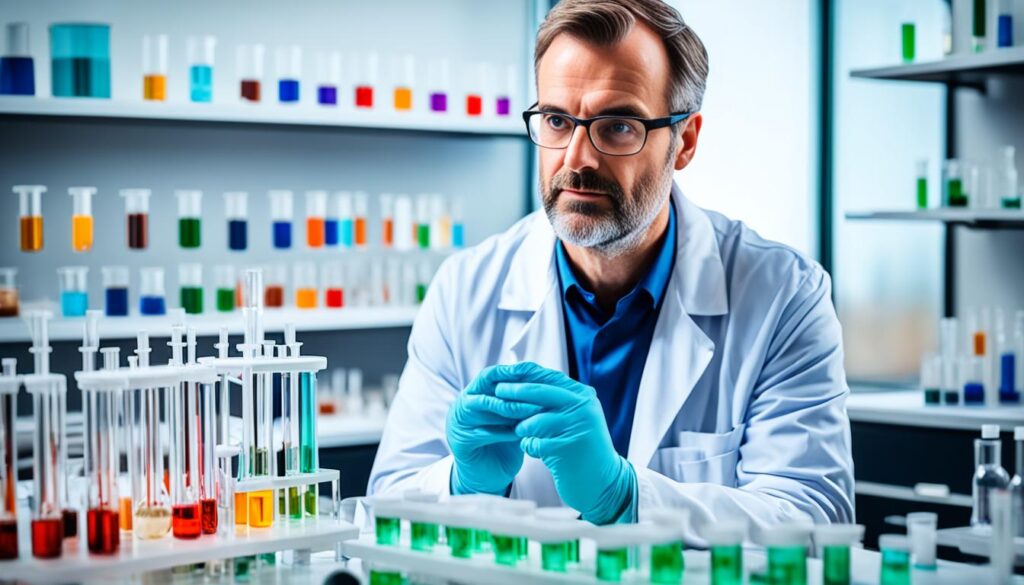
Neuroimaging Insights into Psilocybin’s Effects
Neuroimaging has given us a closer look at how psilocybin changes brain activity and connections12. It shows that psilocybin therapy can change brain networks in ways that help with depression. This includes making the brain more flexible and changing how we see ourselves12.
Brain Activity Changes
Functional MRI scans show big changes in brain networks when people take psilocybin12. These changes might explain why psilocybin helps with depression. The scans reveal a more flexible and connected brain state12.
Psilocybin’s effect on depression is linked to a more connected brain12. Even after the effects wear off, the changes in brain connections last13.
Studies also show that psilocybin can cause a type of psychosis by affecting serotonin levels13. PET scans reveal changes in the brain’s serotonin levels during this psychosis13.
Research has looked into how psilocybin affects brain activity when listening to music13. It shows changes in brain connections. Scientists have proposed theories on how psilocybin works in the brain13.
Psilocybin has been found to change brain activity in healthy people too13. These changes could help explain how psilocybin might treat depression14.
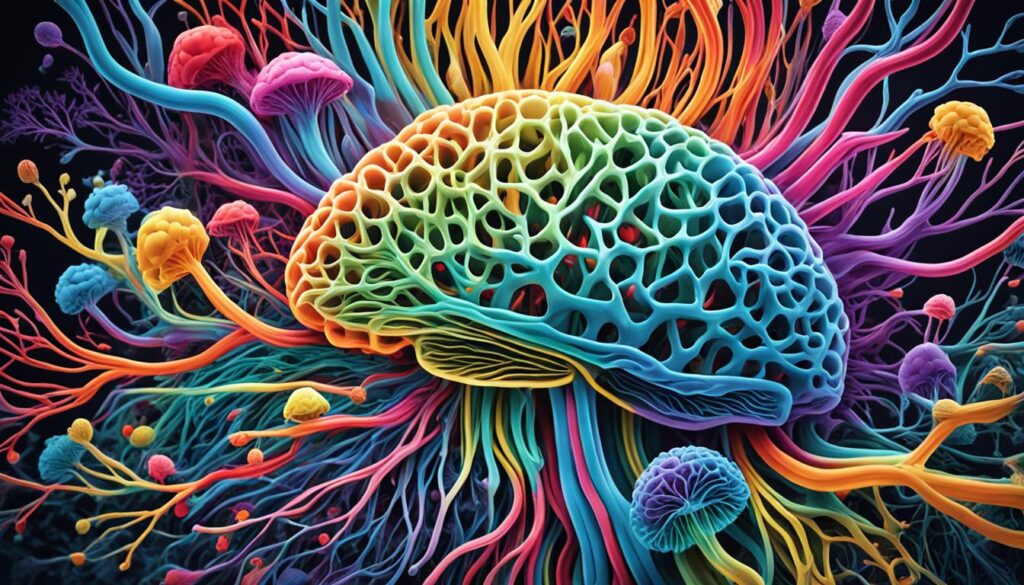
“Psilocybin-assisted treatment for alcohol dependence: a proof-of-concept study yielded promising results with a range of 289–299.”14
psilocybin for depression
Research on psilocybin for depression is growing fast. It’s important to know how much to take, how to take it, and how safe it is15. In studies, people got two doses of psilocybin. The first was 10 mg, and the second was 25 mg, given about two weeks apart15. The sessions were in a controlled place with experts there, and people were told to focus inside themselves for 8 hours.
No serious bad effects were seen, but some people felt anxious or confused for a little while15. Experts say psilocybin should only be given by trained professionals. They warn people not to try it by themselves1516.
Dosage and Administration
Figuring out the right amount of psilocybin for depression is still being studied15. In tests, people got two doses. The first was 10 mg, and the second was 25 mg, given about two weeks apart15. The sessions were in a controlled place with experts there, and people were told to focus inside themselves for 8 hours.
Safety and Side Effects
Studies on psilocybin for depression didn’t find any serious bad effects. The most common side effects were feeling a bit anxious or confused15. Experts say psilocybin should only be given by trained professionals. They warn people not to try it by themselves1516.
Psilocybin therapy includes a lot of preparation and an 8-hour session with two therapists. After that, there are more sessions to help with integration16.
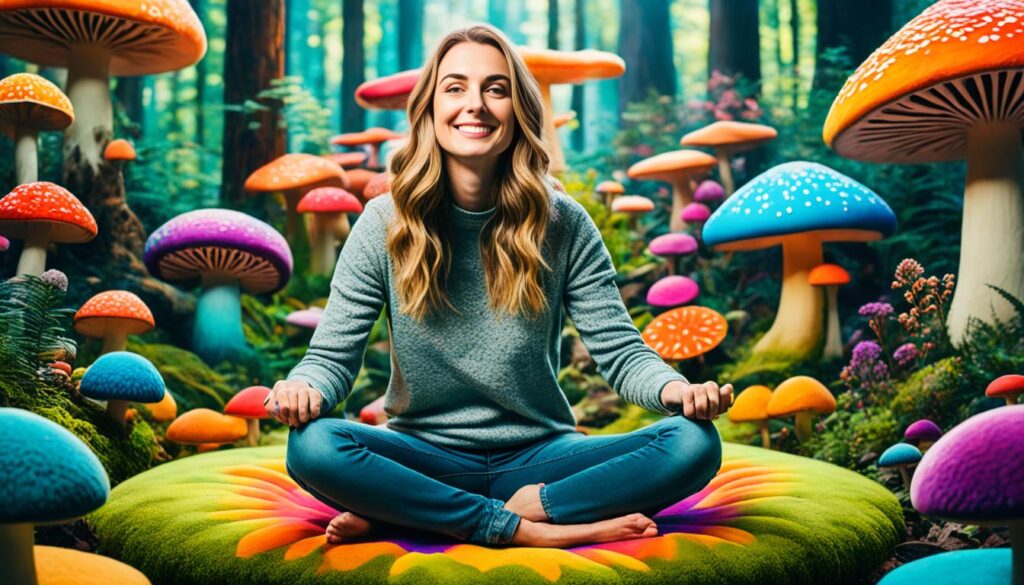
Psilocybin was first looked at in the 1940s and 1950s. Now, it’s being studied again1516. Psilocybin therapy might work differently than regular antidepressants. It could make the brain more flexible and help break negative thinking patterns17.
Experts say don’t try psilocybin for depression on your own. The studies were done in controlled settings with careful dosing and support17.
“Psilocybin has shown promising results in the treatment of major depressive disorder, treatment-resistant depression, alcohol use disorder, anxiety at the end of life, tobacco use disorder, and OCD.”16
The research on psilocybin for depression looks good, but it’s key to talk to doctors. Make sure to get psilocybin therapy in a controlled setting for safety and the right care151617.
Qualitative Findings and Psychological Mechanisms
Researchers have looked into the deep experiences and how psilocybin therapy works for depression8. People said they saw big changes in how they saw themselves and their feelings. This could help them feel better for a long time8. The special feelings and experiences from psilocybin helped reduce depression, showing it’s very helpful18.
Psilocybin can quickly and lastingly improve mental health, even if you’re not depressed19. For those with hard-to-treat depression, it greatly reduced symptoms a week and three months after just two sessions19. It also helped cancer patients feel less depressed and anxious at 3 and 6 months after just one dose19.
Research into psilocybin has given us a closer look at how it helps depressed patients19. People talked about different feelings and changes they saw, like emotional shifts and clearer visuals19. They also felt more connected to the world, noticing more in what they heard and saw19.
Psilocybin seems to work for depression by changing the mind and brain in helpful ways18. Things like feeling a deep connection and seeing the world differently were linked to feeling better after using it18. New brain scans also showed changes that matched up with feeling less depressed18.
“Mystical experience” and “ego dissolution” were key to how psilocybin therapy helped with depression18.
Ongoing Challenges and Future Directions
Clinical trials on psilocybin for depression show promising results. But, researchers face many challenges before it can be used in regular treatment20. They need to work on legal issues, cost, and guidelines20. More studies are also needed to see how psilocybin works in real life and who it helps the most20.
Regulatory and Legal Considerations
Psilocybin is a Schedule I drug in many countries, including the U.S. and Canada20. This makes it hard for researchers and doctors to study and use it for mental health20. They call for careful and evidence-based steps as psychedelic therapy grows20.
Getting approvals and licenses for psilocybin research is tough20. This can slow down studies and make psilocybin treatments hard to get20. It also makes psilocybin expensive, which could stop some people from using it20.
Researchers and policymakers must work together to solve these problems20. They might change the legal status of psilocybin, set clear rules for its use, and make sure it’s affordable for everyone20.
Researchers are hopeful about psilocybin’s future in treating depression and mental health issues20. With more research, efforts to change laws, and careful use, psilocybin could become a common treatment20.
“As the field of psychedelic research continues to evolve, researchers and policymakers will need to work collaboratively to address these regulatory and legal challenges.”
The Psychedelic Renaissance
In the last 20 years, there’s been a big comeback in studying the healing power of psychedelics like psilocybin. This “psychedelic renaissance” started because studies showed these compounds could help with mental health issues, like depression21.
Public Perception and Acceptance
But, people’s views on psilocybin and other psychedelics as real medical treatments are still mixed. There are legal and regulatory hurdles22. Even so, some places are easing up on rules, like the U.S. FDA giving special status to MDMA and psilocybin for mental health22. Society and policies are slowly catching up.
More people are getting interested in psychedelics thanks to famous people sharing their stories and patients talking about their experiences. They see these substances as a way to tackle the huge mental health issues that are overwhelming our healthcare systems22. Psychedelics could be a big help for mental illness, which is really straining our healthcare.22
But, we need to be careful when adding psychedelic therapy to regular treatment. It might take a while, five to 10 years, before it’s widely used because of the need for more studies21. Also, we’re learning how important it is to listen to Indigenous views and traditional uses of these plants. This helps us understand psychedelics better and their possible benefits22.
As we keep learning more, figuring out how to make psilocybin therapy work in everyday life will be key. This could make the “psychedelic renaissance” a real option for people dealing with mental health issues212223.
Conclusion
Research on psilocybin therapy for depression shows promising results. It could help some patients feel better for a long time24. Studies show it works better than usual antidepressants, with big improvements in symptoms7. But, we need more studies to understand its safety and long-term effects7.
There are also legal and regulatory issues that need to be solved before it can be used more widely7. As we learn more about psychedelic therapy, we must use evidence to decide how psilocybin can help with depression8.
While early results are encouraging, we still have a lot to learn about psilocybin for depression247. We must overcome legal and regulatory barriers to make it available to more people7. A careful, evidence-based approach will guide us in using psilocybin for depression in the future8.
In summary, psilocybin therapy offers hope for depression, but we’re not there yet2478.
FAQ
What is psilocybin and how does it work for treating depression?
What are the key findings from clinical trials on psilocybin for depression?
How is psilocybin administered and what are the potential side effects?
What are the ongoing challenges and future directions for psilocybin-assisted therapy for depression?
What is the current public perception and acceptance of psilocybin as a medical treatment?
Source Links
- Psilocybin Treatment for Major Depression Effective for Up to a Year for Most Patients, Study Shows
- How psychedelic drugs may help with depression
- Depression: Psilocybin from magic mushrooms shows promise as treatment
- Psilocybin for the Treatment of Depression: A Promising New Pharmacotherapy Approach
- Efficacy of psilocybin for treating symptoms of depression: systematic review and meta-analysis
- Psilocybin for treatment-resistant depression without psychedelic effects: study protocol for a 4-week, double-blind, proof-of-concept randomised controlled trial
- Patient perspectives and experiences with psilocybin treatment for treatment-resistant depression: a qualitative study – Scientific Reports
- Psychotherapy with Psilocybin for Depression: Systematic Review
- CAMH receives first Canadian federal (CIHR) grant to study psilocybin
- Efficacy of psilocybin for treating symptoms of depression: systematic review and meta-analysis
- Single-Dose Psilocybin Treatment for Major Depressive Disorder: A Randomized Clinical Trial – PubMed
- Increased global integration in the brain after psilocybin therapy for depression – Nature Medicine
- Neuroimaging in psychedelic drug development: past, present, and future
- Neural mechanisms underlying psilocybin’s therapeutic potential – the need for preclinical in vivo electrophysiology
- Self-administration of Psilocybin in the Setting of Treatment-resistant Depression
- Mushrooms for Depression? Psilocybin is Showing Promising Results
- Psilocybin Rewires the Brain for People with Depression
- Unique Psychological Mechanisms Underlying Psilocybin Therapy Versus Escitalopram Treatment in the Treatment of Major Depressive Disorder – International Journal of Mental Health and Addiction
- Effectiveness of Psilocybin on Depression: A Qualitative Study
- Psilocybin-assisted therapy for depression: A systematic review and meta-analysis
- ‘Psychedelics renaissance’: new wave of research puts hallucinogenics forward to treat mental health
- Alberta’s new policy on psychedelic drug treatment for mental illness: Will Canada lead the psychedelic renaissance? – News
- A Psychedelic Renaissance
- Analysis of Psilocybin-Assisted Therapy in Medicine: A Narrative Review
